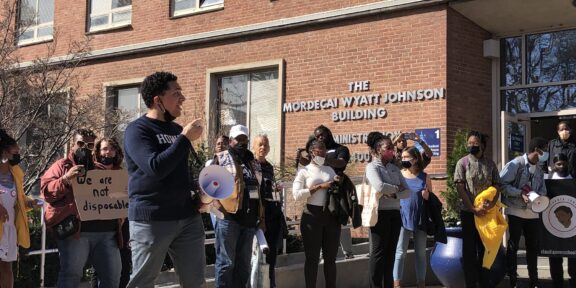University Programs Let Students Download Music For Free
Chesney Bean, a transfer student at American University was surprised this semester when she saw her classmates watching movies on their laptops in class and downloading hits from Usher and Alicia Keys onto their computers on campus.
She said, “I had heard that downloading music and movies was illegal, so I was surprised to hear students talking about it freely and excitedly on campus.”
Bean’s classmates are downloading music, movies and television shows, but what her classmates are doing is not illegal. They are taking part in a new venture from the University with Ruckus Network, Inc. Ruckus is a comprehensive digital download company based in Herndon, Virginia that has set up partnerships with several U.S. colleges including American University, Bentley, the University of North Carolina and the University of Delaware. Catered to college students, Ruckus has partnered with some big name music labels including Sony and Universal Music group, to allow free or cheap downloading of music and movie files onto students computers.
Ruckus’ service offers unlimited downloads for a flat fee from a library of more than 525,000 songs and a collection of 50 full-length movies and television shows that rotate monthly. More than 1,000 new release movies, can be downloaded for about $2.50 each.
Other companies similar to Ruckus like RealNetworks Inc, Napster, Cdigix and Sea Blue Media have been quick to realize the potential customer base found in college students. Most young adults in the 18 to 24 age range grew up downloading music from Kazaa, Napster or Ares for free, but after the high profile downloading cases that have landed some students in jail and others with hefty fines , they were left with few legal choices.
Now on the heel of the popularity of iPods, and other digital downloading devices, companies are bringing music back to students free of charge or for less to nothing – with their university’s approval, because the threat of viruses attacking the school network are less likely.
arcia J. Smith, a freshman student at Howard University and frequent digital downloader said, “I hope my school gets a deal with a digital provider soon. The internet is slow on campus and sometimes unreliable.”
She said that she would also feel safer downloading movies and music through a subscription downloading service because there is less threat of getting a virus and less need for firewalled protection. She said, “To me the [Ruckus] program sounds great.”
While most companies offer introductory services free to students, one factor for universities is the cost, which right now is levied at the administration. In an Associated Press article, American University, would not disclose how much money the Ruckus system cost, but said that the money came from a generous, anonymous donor to the school in the nation’s capital.
The same article said that the University of North Carolina system got $150,000 from Sony BMG in the fall to offer services in dormitories across five campuses.
Some American University students like Bean, would still want the digital downloading service if they had to pay for it. At least three American University students were among hundreds of college students nationwide forced to pay thousands of dollars to settle copyright suits by the recording industry in the past.
American is not the only school in the Washington, D.C. area to offer subscription based discount downloading to its students. Loyola College in Maryland, offers music downloads from the leading provider Cdigix. Cdigix has contracts with over 20 Colleges and Universities and features pay per view movies on the computer and also has the capability to transfer music files to portable devices like the iPod for a small fee. It also currently has a partnership with some cable networks including ESPN, TBS and Cartoon Network which all feature popular shows for teens and college-age students like Adult Swim and World Series of Poker.
One downfall of the college based digital downloading services is that your catalogue of music and movies only lasts until graduation. The library is maintained through the specific server and is automatically crippled after the student leaves the university at graduation unless the users keep paying a monthly fee that is higher than what a school typically charges.
While the new system may not be perfect, it is another way student can avoid fines and still avoid downloaded music and movies.



